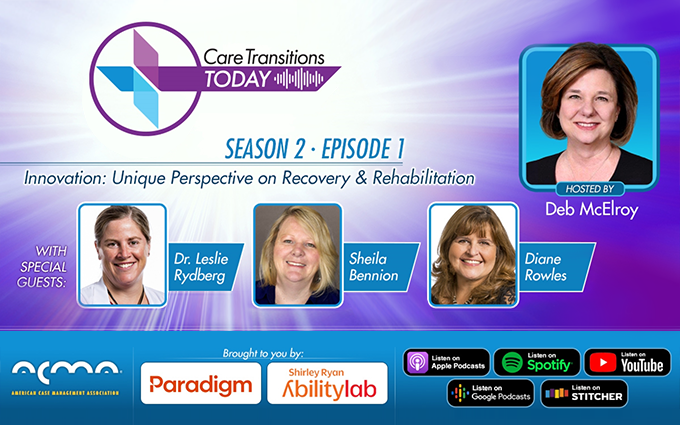04/06/2021

Sheila Bennion, Director of Clinical Services for Paradigm, and a leading expert in severe and catastrophic case management, was a recent guest on the American Case Management Association’s (ACMA) Care Transitions Today podcast. Hosted by Deb McElroy, ACMA Senior Vice President of Practice Management, the podcast focuses on case management and transitions of care throughout the spectrum of health care systems.
For this episode, “Innovation: Unique Perspective on Recovery and Rehabilitation,” Bennion was joined by Dr. Leslie Rydberg, attending physician at Shirley Ryan AbilityLab, and Diane Rowles, Director of Inpatient Access at Shirley Ryan AbilityLab. Throughout the discussion, all three shared their experience in fostering COVID-19 recovery and the approaches required to achieve success. Bennion repeatedly emphasized the effectiveness of innovative care, particularly in COVID-19 workers’ compensation cases, whether that meant adjusting goals, implementing telehealth, or recognizing an increased need for behavioral care.
Recognizing the immense need for post COVID-19 rehabilitation early on
According to Dr. Rydberg, setting up an interdisciplinary team for COVID-19 rehabilitation was a critical goal in the early days of the pandemic. She and other members of her team created a specialized inpatient unit to deal with the highly specific post-acute care needs of coronavirus patients. Rowles added that one of the biggest challenges with respect to ensuring successful post-acute care has been timing the transition from ICU, noting that the earlier the rehabilitation team can begin to participate, the better.
Bennion echoed this sentiment, adding that it was also essential to adjust goals for severely ill COVID patients, especially those who had been on a ventilator and were severely deconditioned. She gave a specific example of a patient who achieved success by working up to a personalized rehab goal in a situation where more rigid guidelines may have been the standard.
For patients in rehabilitation, all experts stressed the importance of a comprehensive interdisciplinary team for effective COVID-19 treatment. This should include physicians, nurses, physical and occupational therapists, speech therapists, behavioral therapists, and even dietitians to address the nutritional deficits many patients in COVID-19 ICU experience.
Transitioning to home and recognizing ongoing COVID-19 recovery
With many COVID-19 workers’ compensation patients, simply being discharged from rehabilitation could be a success story. Bennion, Dr. Rydberg, and Rowles all shared stories of patients whose very severe cases made truly remarkable progress. However, once a person is discharged to their home, it is crucial to look at ongoing care needs, especially the psychological effects of COVID-19, to ensure long-term recovery. So often, patients and their families have dealt with extended periods of isolation, anxiety due to fear of the virus, and other issues that require behavioral support, including family education.
Bennion discussed some of the innovations, including telemedicine for physical and behavioral care, that Paradigm has integrated into COVID-19 treatment plans for patients in the home setting. She also stressed the importance of providing resources for ongoing COVID-19 rehabilitation, such as pulse oximeters, and wheelchairs or walkers to aid mobility.
Returning patients to the community and closing thoughts
Successfully helping these patients return to work and re-enter society after COVID-19 treatment brings unique challenges as well. According to Rowles, it’s truly a team effort to establish a baseline for what was normal before setting post-recovery expectations. Bennion also discussed the logistical needs, including the hurdles and innovations required to release patient information and facilitate remote doctor visits, during the pandemic.
In closing, Bennion, Dr. Rydberg, and Rowles each reflected on the last year. All three stressed that, despite the immense difficulties that the pandemic brought, they have been inspired by the patients they’ve seen, and gratified by how quickly and effectively the industry as a whole adapted.
Learn more about Paradigm Contagion CareSM, our award-winning, one-of-a-kind program to give injured workers with COVID-19—and their families—the very best chance of an optimal outcome.